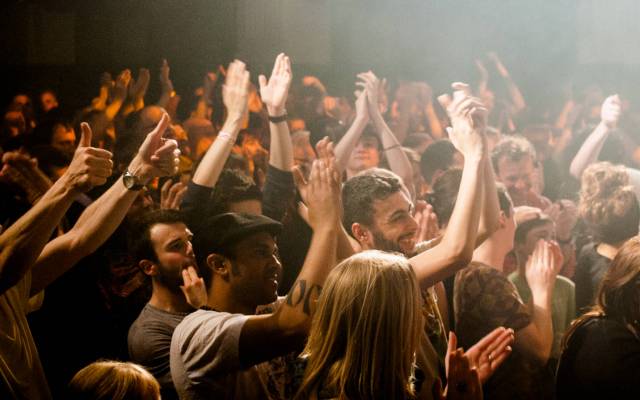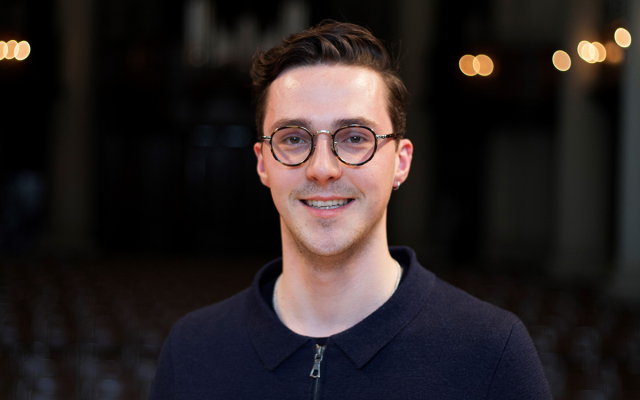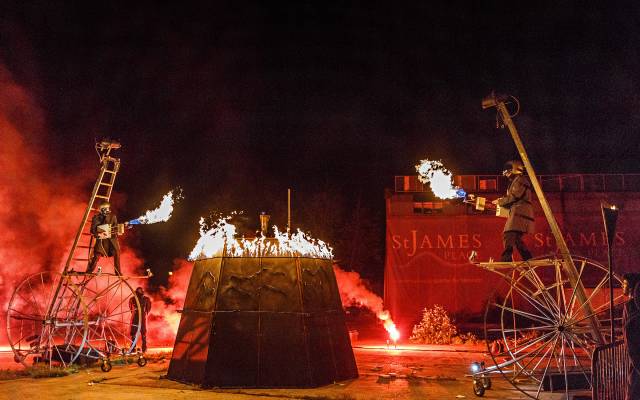23.11.20
Creative Careers: An Honest, Optimistic Q&A with our Team
This weeks marks the start of Engage Works, an online programme from Young Norfolk Arts exploring creative career pathways and activism. With a programme of free creative workshops, webinars and advice, it got us at the Festival thinking about our own career paths. Brexit, COVID and ‘Fatima-Gate’ have sparked plenty of recent discussion about the sector – how viable is an job in the arts? Never ones to shy away from a debate, we asked colleagues across Festival departments (from Finance to Production to Development) their take on creative careers, quizzing them on everything from career paths to their predictions for the industry’s future. If you’re interested in working in the arts, or if you’re just keen to learn more about the Festival Team, this is the Q&A for you!
For context, describe your role in 5 words or less.
Daniel: Artistic Director and Chief Executive (my title is five words!). My role is to lead the artistic vision of the programme and the smooth running of the organisation.
Sarah, Creative Learning Manager: I help people take part.
Mark, Head of Production & Programme: Imagine, budget, organise, create, deliver.
Gemma, Development Manager: Fundraising from businesses and individuals.
Summarise your career path.
Daniel, Artistic Director: My first arts job was as an administrator in a funding organisation. I did endless photocopying and got biscuits for meetings but I also listened and learned. All sorts of opportunities have come up through my career – some offered to me and some I’ve made myself. Sometimes a job has felt like a wasted opportunity but mostly I’ve learned something that I’ve taken with me to the next job. I’ve never really been ‘heading’ anywhere (I didn’t set out to be a festival director) but I’ve followed my interests, layering up my skills and experience as I go.
Brenda Seymour, General Manager: First thing to say is that none of the jobs I have done in the arts sector over the past twenty plus years existed when I was at school. I graduated with a BSc in Textile Design just at the time when the UK textile industry collapsing. My first job within the arts was as administrator to a group of community artists in Lincolnshire. While in Lincolnshire I studied for a Post Graduate Diploma in Arts Administration. This experience combined with my studies enabled me to take my next step as Arts Officer for North Norfolk District Council, a post I held for 13 years. On leaving North Norfolk I joined the team at SeaChange Arts as Development Director. Here I led on governance, finance, HR and fundraising and during my time there the organisation joined the Arts Council’s National Portfolio and undertook a major capital development project of the Drill House, SeaChange’s home. On completion of the capital project I left SeaChange and moved back into Local Authority employment this time at Norfolk County Council’s Music Service. As Strategic Hub Development Manager I was responsible for the allocation of the annual £1m plus Music Hub grant from the Arts Council and for partnership development. Each of these roles has contributed some way in giving me the experience, knowledge or skills to undertake my current role at Norfolk & Norwich Festival (NNF).
Gemma, Development Manager: This is my first job in the arts and in fundraising! I studied marketing and previously worked as a marketing manager for commercial businesses, as well as a national charity.
Sarah, Creative Learning Manager: I studied Film and Media at university and went on to work in TV production for a number of years after graduating. I always had an interest in the arts and also in education and participation in the arts. I took a side step to work in a school as a teaching assistant which made me realise that I wanted to support children in having more creative, arts and cultural experiences. I then spotted a Creative Learning Assistant job at NNF, and ten years later I’m still here as Creative Learning Manager, in a place that really helped me grow in my career in learning and participation in the arts.
Imogen Frith, Finance Manager: I was already working for a charity and was made redundant, so I had charity experience. I was so lucky, as I needed to work part-time, but when I first started at NNF, it was only 8 hours per week, so it was quite a struggle financially at the beginning.
Mark, Head of Production & Programme: I’ve always enjoyed organising and especially enjoy taking something from an idea to a reality. It started with live music at school, playing in bands and organising our own festivals. I wasn’t someone who knew exactly what I wanted to do, and how I was going to get there from an early age, and I had a period of doing different jobs and experimenting in photography and radio production whilst I studied Sociology and Social Psychology at University. I always enjoyed working in a group of people and when working in live music didn’t become my perfect fit (as I had imagined it would) After working for a couple of years as a financial adviser in student services at my local college, I went back to University to study for a MA in Event Management (which was a pretty rare course back then!). It was like everything suddenly made sense. I would read nonstop about the impact of cultural events. Not just on people, but on the places they lived and entire communities. I studied the cultural impact of the Commonwealth Games in Manchester and started to look for work at an arts festival. I got a chance to work at NNF and took it, whilst also gaining invaluable stage management experience at Sheringham Little Theatre for a number of years. I have spent the last 13 years developing my understanding of arts and culture through production and delivery of an amazing wide range of events for an amazing range of audiences.
Did you always want to be in the area of the arts you’re in now?
Sarah, Creative Learning Manager: I used to perform, but I’d say that I’m not a natural performer. I’ve always preferred supporting other people in achieving goals and in giving the opportunity to people that might not ordinarily have that opportunity to have arts experiences. From my first year in Creative Learning I realised it was something I enjoyed and was good at. I think you need to be passionate about the arts to be able to do a job like this well as well as being passionate about reaching others with your work.
Mark, Head of Production & Programme: I guess I never knew that you could work in event production when I was starting out. I wanted to make things happen and never felt restricted by venues or artforms.
Brenda, General Manager: All of the roles I have undertaken have had elements of strategic and organisational development so I guess the answer is yes although it wasn’t a conscious decision at the start.
‘You’re always creating. Things are rarely repetitive. You can ask interesting questions of people and places and there is a satisfaction of delivering projects for audiences.’
What’s good about working in the arts?
Gemma, Development Manager: Getting to work with a bunch of talented people who are truly passionate about what they do.
Imogen, Finance Manager: They’re mainly small organisations, so you get lots of variety in the job i.e. I can deal with income in the morning, sending out invoices in the afternoon, and payroll next day.
Daniel, Artistic Director: The arts are full of people with interesting ideas.
Sarah, Creative Learning Manager: You meet so many interesting people and experience things you wouldn’t in other jobs. And although there’s a routine to my job, in that I have admin to do and there’s certain things I do each year, the job stay exciting by working with new artists and having new themes etc each year.
Mark, Head of Production & Programme: You’re always creating. Things are rarely repetitive. You can ask interesting questions of people and places and there is a satisfaction of delivering projects for audiences.
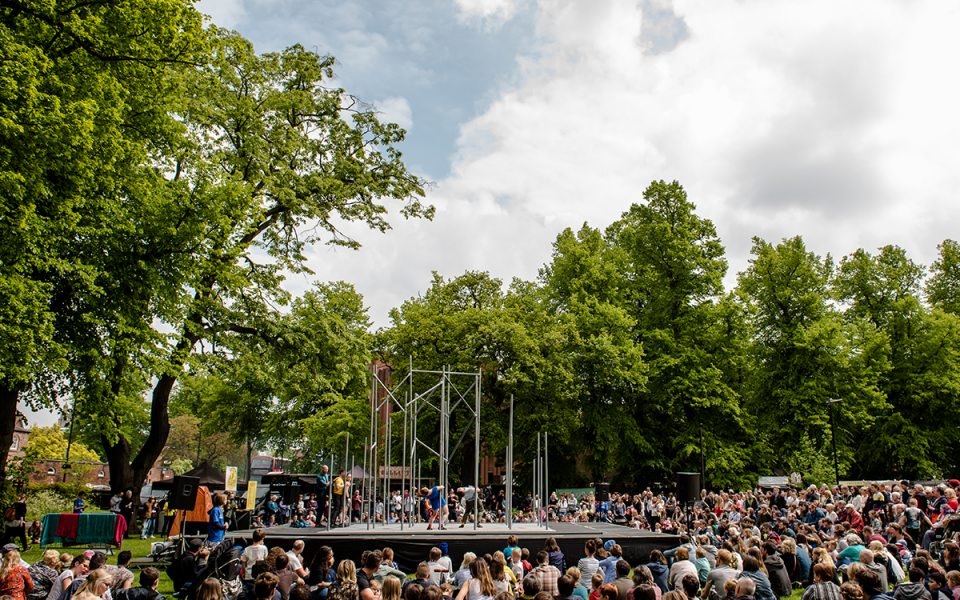
What’s bad about working in the arts?
Mark, Head of Production & Programme: There are challenges in terms of finances and permissions. Sometimes people are (naturally) hesitant to be involved in projects and things can take time. There are also often unstable financial situations that means there can be a lot of work that goes for nothing.
Sarah, Creative Learning Manager: The only bad things I can think of is when the arts are sometimes under estimated or downgraded by others. A career in the arts is a viable career, there are so many possibilities and such a wide range of job roles in the creative industries, which often give you amazing transferable skills.
Imogen, Finance Manager: There aren’t that many finance opportunities. Before I came to the Festival, finance was done only in a voluntary capacity, including payroll (which was done by a trustee).
Brenda, General Manager: Challenge of regular funding
‘it’s ok to follow your interests and seek out doing the things you enjoy. People will value your enthusiasm and opportunities will likely follow’
What advice would you give to someone looking to start or develop their arts career?
Daniel, Artistic Director: The thing I wish someone had told me at the start of my career is that it’s ok to follow your interests and seek out doing the things you enjoy. People will value your enthusiasm and opportunities will likely follow.
Gemma, Development Manager: Volunteer or apply for internships or trainee schemes.
Sarah, Creative Learning Manager: Get as much experience as you, as an audience member, watch free stuff online, see what’s being made in your local area, see if you can volunteer to help and get some experience. Create something yourself. And apply for as many jobs and opportunities as possible.
Mark, Head of Production & Programme: Don’t rush, be patient, and try as many angles and aspects to the work as possible. There are many interesting areas to contribute to and be a part of.
Brenda, General Manager: Go for it, work hard and enjoy it.
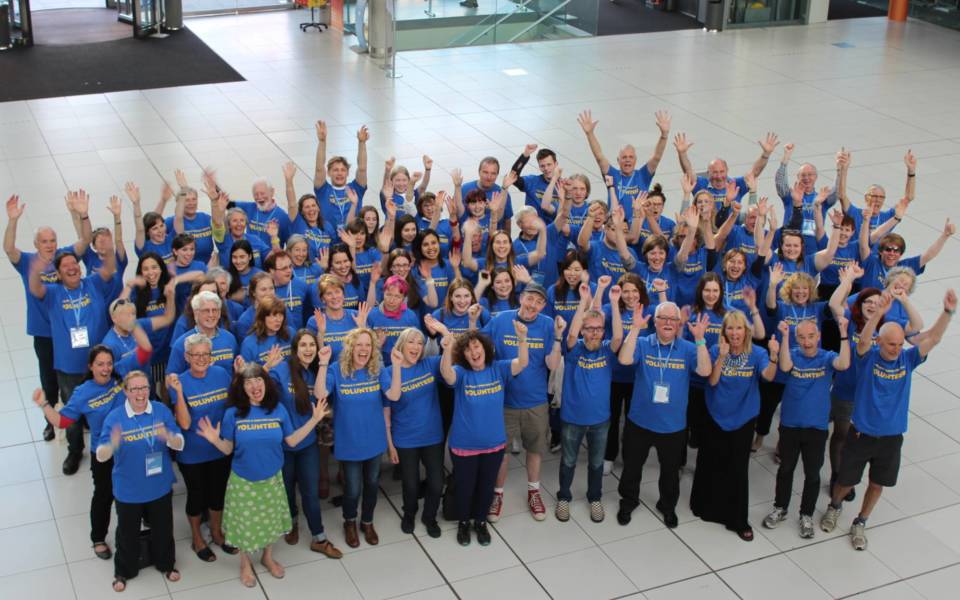
‘The arts sector has been hugely affected by COVID but people’s desire for live music, performance and art will remain. Things will get better’
How do you think COVID will change the jobs landscape in the arts?
Brenda, General Manager: Of course it’s now tougher than it was a year ago. The whole sector is going to need time to recover but creativity is in our veins and recover it will – we just don’t know how long it’s going to take.
Daniel, Artistic Director: Right now lots of arts organisations are slowing-down or even closing and there are less jobs. But this won’t last forever. Sooner or later things will pick up again and there will be job opportunities. It might even be an exciting time to join the arts, as artists and organisation think of ways to do things differently.
Gemma, Development Manager: The arts sector has been hugely affected by COVID but people’s desire for live music, performance and art will remain. Things will get better – use this time to volunteer or undertake training which gives you the skills needed for the job you would love to have.
Mark, Head of Production & Programme: Many people have lost their jobs already. It’s a nervous time, but things will pick up and the future is bright. Society will always need culture and it’s a valuable part of lives. I’m optimistic about the longer term but things may feel tough for a little while.
Engage Works runs from Mon 23 – Fri 28 Nov 2020, and you can find out more about the brilliant year-round work being done by Young Norfolk Arts here.
Masthead Image: Wildlife, Festival 2015 © JMA Photography Copy Image: Singer Songwriting Workshop, Dersingham © Paul Harrison Wild, Motionhouse, Garden Party 2019 © JMA Photography Volunteers, Festival 2018 © Becky Demmen
